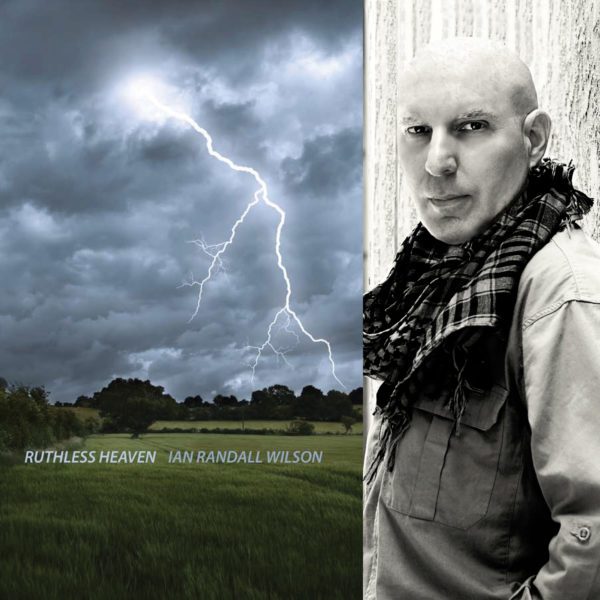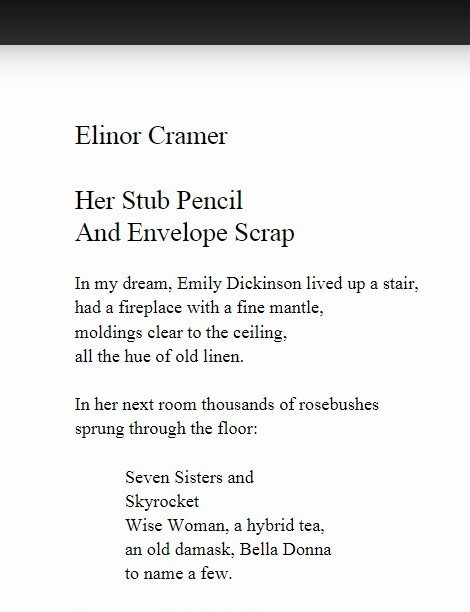Ian Randall Wilson (poetry, ’02; fiction, ’16) has a new collection of poems, Ruthless Heaven, available now through Finishing Line Press.

Ian Randall Wilson (poetry, ’02; fiction, ’16) has a new collection of poems, Ruthless Heaven, available now through Finishing Line Press.

 A poem by Kimberly Kruge (poetry, ’15) appears in Poetry Northwest:
A poem by Kimberly Kruge (poetry, ’15) appears in Poetry Northwest:
Apology
Sometimes I forget where I am.
I go as far as the patio and hear
three dogs wailing into the night.
Dogs that still have ardor in them. I see
shadows that fold into the honey of dirt
and its fruits being molded into shapes.
The silver tooth of some sister somewhere.
Someone, somewhere, not dying.
A town on the horizon lights
. . . continue reading here.
 Work from Kimberly Kruge (poetry, ’15) appears in Witness:
Work from Kimberly Kruge (poetry, ’15) appears in Witness:
from “ARTICULATION”
A Michoacán pine loosens a spirant into the night, and deeper, the collective forest modulates a fricative. Deeper yet, the forest on fire. Silently. Suddenly: I hate everything I’ve ever written. Even the alright utterance. The forest, on the other hand, really knows how to put an observation between its teeth and let it speak for itself: order in not disrupting the order.
In June, advances. The rain. The frog mates. The velvet spider emerges. June: the whip snake, the reproduction of the winged ant.
. . . continue reading here.
 A story by Eric Rampson (fiction, ’16) appears in Penultimate Peanut Magazine (keep scrolling down for the story):
A story by Eric Rampson (fiction, ’16) appears in Penultimate Peanut Magazine (keep scrolling down for the story):
Like the Skins of Great Beasts
I hunt them. I go to where they are and I wait for them. I glimpse them. A rustling, they move through the periphery. They glide and shift. I never see them in full, only flashes and hints, suggestions, and a certain dread.
I hunt them inelegantly. There is no smooth take-down. There is no whisper-soft kill. There is blunt force trauma. There is blood and noise. There is wrestling with jaws, claws, and all manner of horns, spikes, razor-sharp plates. … continue reading here.
Three poems by Angela Narciso Torres (poetry, 09) appears in Jet Fuel Review:
Confessions of a Transplant
My first year living in America
the scent of frying garlic
sent me weeping. My eyes
swept the somber avenues
starving for color. I devoured
the aquamarine of broken glass,
a wire festooned with yellow shoes,
the sudden shower of rose
on a sidewalk. The memory
… continue reading this poem and others here.
 A guest post by Muriel Nelson (poetry, ’96) appears in Superstition Review:
A guest post by Muriel Nelson (poetry, ’96) appears in Superstition Review:
Looking for Inspiration, Distraction, or Most Anything That Doesn’t Start with T or Rhyme with Rump
Coffee, yes.
Pink hats, yes.
Chocolate, yes.
But none of these inspires for long. Just look at the length of those “paragraphs.” The poems I wrote last winter were equally stunted.
I tried starting each day with coffee and resistance.
• Email Electors. Their purpose is to protect us from an unfit candidate, right?
• Sign petitions. We’re the majority. We’re strong if we stick together. We need to save what’s worth saving! (Can we?)
• Challenge the NYT to publish a front page without mentioning #45. Don’t play what he deals!
• Contact GOP senators without revealing my blue-state zip code.
I tried pink wool next, along with gutsy poets Eleanor Wilner and Maxine Kumin. Later I read Mark Twain for his anger and humor combined and Dietrich Bonhoeffer for his thoughts on hilaritas from inside a Nazi prison.
. . . continue reading here.

Victoria Chang (poetry, ’05)
A poem by Victoria Chang (poetry, ’05) appears in The San Francisco Chronicle and is reviewed by David Roderick.
Barbie Chang Got Her Hair Done
Barbie Chang got her hair done for
the school auction
she was afraid sick of the Circle since
she heard of their
shopping for matching dresses so out
of the nest she flew
into the auction thinking she could
outmaneuver her
. . . continue reading here.

Emily Sinclair
A story by Emily Sinclair (fiction, ’14) appears in Cheat River Review:
Wildland
It was the second week in September, and bright yellow mums in buckets sat outside the Safeway, in Steamboat Springs, Colorado. On impulse, I grabbed a bucket, imagining the flowers on my front porch, a spot of color against the gray hazy air from wildfires twelve miles to the north. As I pushed my cart through the store, two women stopped me to say how beautiful they were, how they wanted them, too. For dinner, I bought colors: red peppers, green acorn squash, yellow carrots.
The fire had started three days before; by the second day, it had grown, uncontained, to more than two thousand acres; by day four, nearly four thousand.
… continue reading here.
 A poem by Ian Randall Wilson (poetry, ’02; fiction, ’16) appears in Scoundrel Time:
A poem by Ian Randall Wilson (poetry, ’02; fiction, ’16) appears in Scoundrel Time:
The Peace Grant
No singing of any
kind. All year the rooms dark.
Then a week of lights.
The owners have returned,
their daughters haunt
the balconies.
One of them looks at me
. . . continue reading here.
Poems by Elinor Cramer (poetry, 92) appear in Nine Mile:
. . . to read the rest of this poem and more of her work, click here.
